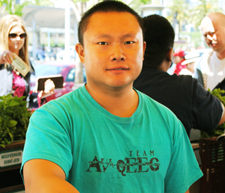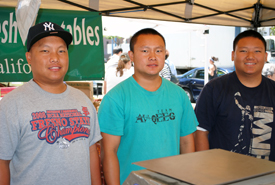Next Generation Farmer: Tou Moua
July 22, 2011
 The Mouas are anything but chatty. This team of siblings is a regular fixture at the Tuesday and Saturday markets, where they can be found in the Chue’s Farm booth in groups of two to four (there are eleven in all). Tou Moua, a middle child who’s been helping with the market since fifth grade, and is there nearly every Tuesday, is one of the more talkative members of the family. Yet even he comes across as quiet and unassuming, and when you ask him about the farm, he doesn’t mince words. “It’s hard for us to have another life besides farming,” he says.
The Mouas are anything but chatty. This team of siblings is a regular fixture at the Tuesday and Saturday markets, where they can be found in the Chue’s Farm booth in groups of two to four (there are eleven in all). Tou Moua, a middle child who’s been helping with the market since fifth grade, and is there nearly every Tuesday, is one of the more talkative members of the family. Yet even he comes across as quiet and unassuming, and when you ask him about the farm, he doesn’t mince words. “It’s hard for us to have another life besides farming,” he says.
Tou and his siblings are all in school full time in addition to working long hours on the farm. The 25-year-old, whose name is pronounced like the number, has been a student at Fresno State University for the last several years, and is enrolled in a nursing program at Fresno City College that begins this fall. “School and farming: those are our priorities,” he says. Free time is still limited, but sports are a close third for many of the Mouas; Tou even coaches a women’s flag football team on Sundays for fun.
Their parents, Peter and Cha Moua, came to the US from Laos via Thailand, as part of a wave of Hmong (an ethnic Laotian minority) farmers who came to the US as refugees in the 1980s after facing persecution at home. The family arrived in 1987 (with eight children at the time). Today they farm eight acres in the Fresno area, where they grow a wide range of the vegetables their ancestors have always grown and some North American additions. Peter and Cha are in their 50s and hope to be able to work on the farm for another decade, but it’s clear that the Moua children, led by one of the older brothers, Chou Yee, are the backbone of the business.
After Tou finishes the 18-month nursing program, he’ll likely become a registered nurse, but that won’t stop him from helping on the farm. “Nursing is very flexible — you work one week, then get a week off.” Most of the family plans this way, he says. “One sister is a nurse, one is an accountant, and one brother is working to become a pharmacy technician. But they’ll probably all stay involved.”
 Most of the Moua kids live at home and none make an official salary (or hourly, for that matter), but Tou says he’s always been able to ask his parents for whatever he needs, and the family shares an understanding that they all work together to make the business succeed. On Fridays — the family’s longest day — they start work around 6 am and spend as many as 12 hours harvesting and packing their truck for Saturdays, the bigger of their two sales days. “Growing up,” he says, “we always worked at the farm, so we never had a Friday night out.”
Most of the Moua kids live at home and none make an official salary (or hourly, for that matter), but Tou says he’s always been able to ask his parents for whatever he needs, and the family shares an understanding that they all work together to make the business succeed. On Fridays — the family’s longest day — they start work around 6 am and spend as many as 12 hours harvesting and packing their truck for Saturdays, the bigger of their two sales days. “Growing up,” he says, “we always worked at the farm, so we never had a Friday night out.”
But when Tou talks about his family, he never sounds like he’s complaining. And, if pressed to identify the biggest challenges he faces, it becomes clear that he’s grown up hearing about a type of hardship that is far more difficult than farm work.
“We weren’t spoiled but it wasn’t ever really hard for us. When my parents were growing up, they never had much. My dad had to leave his parents in Laos and my parents took off into the jungle and went to Thailand around 1980,” he says. “We hear a lot of stories; my dad’s younger brother passed away right in his arms, and my mom is hard of hearing on the left side because she was too close to a plane that crashed during the war.”
This innate understanding of what their parents endured has made the Moua children especially hard workers. And, when it comes to succeeding at school and sports, they’re a competitive bunch. “Except,” says Tou, “when we’re farming, everybody’s at the same level; everybody knows their part.”
Pictured at top: Tou Moua. Pictured at bottom: Kong Moua (28), Tou Moua (25), and John Moua (16).
